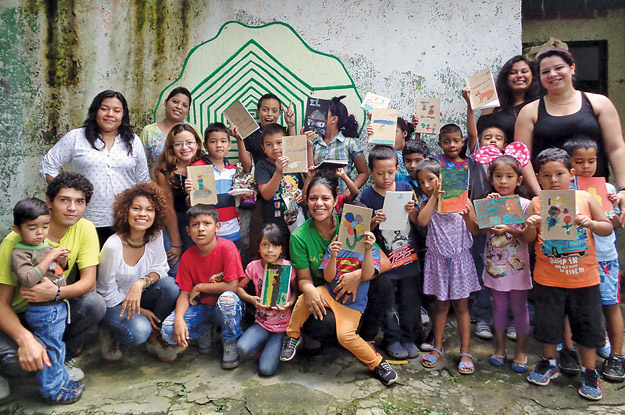This article is adapted from AQ’s most recent print issue. See all our Top 5 Young Latin American entrepreneurs here. | Leer en español
When students misbehave in class in El Salvador’s public schools, they are not punished by being sent to the principal’s office. Instead, they are forced to go to the library. This creates a stigma around reading, said social worker Rocío Mendoza.
“Libraries and books are not spaces for punishment,” Mendoza told AQ. “They are spaces to enjoy yourself, to learn and to read.”
Driven by the desire to share her connection with books, libraries and learning, Mendoza joined fellow social worker Marilin Cabezas and started the Leer Para Soñar, or Read to Dream, initiative in 2016. The project, with a staff of only three, assembles and distributes books made of cardboard and natural products, with the goal of helping provide quality reading material in El Salvador and doing it in a sustainable, environmentally responsible way.
The idea came from the Cartonero Movement in Buenos Aires, which produces low-cost, artisanal books with cardboard, paint and thread to make them more accessible. Mendoza and Cabezas entered the concept in a social entrepreneurship competition for women in 2016. When they won, they used the seed money to get Leer Para Soñar off the ground. Today, they assemble and distribute the books themselves by hand.
Making reading more accessible and improving students’ view of schooling is key in El Salvador, where the literacy rate is 88 percent, Mendoza said. This has improved over time — in 1992 the literacy rate was 74 percent — but economic difficulties still force many students to abandon school in order to work. Violence is also a hurdle.
“Schools are not even safe spaces for kids to distract themselves from the violence in their communities,” Mendoza said. “They’re just other spaces that they’re forced into.”
Despite their efforts, getting the books to the students who need them the most remains a challenge. “The professors and the principals are closed off to it because we’re young and we have different methodologies,” Mendoza said. “There’s a lot of distrust.”
But despite these roadblocks, Cabezas said their objective remains firm: “To promote quality education,” she said, and especially, “for students to enjoy it.”
—
Hanaa’ Tameez is an editorial intern at AQ





